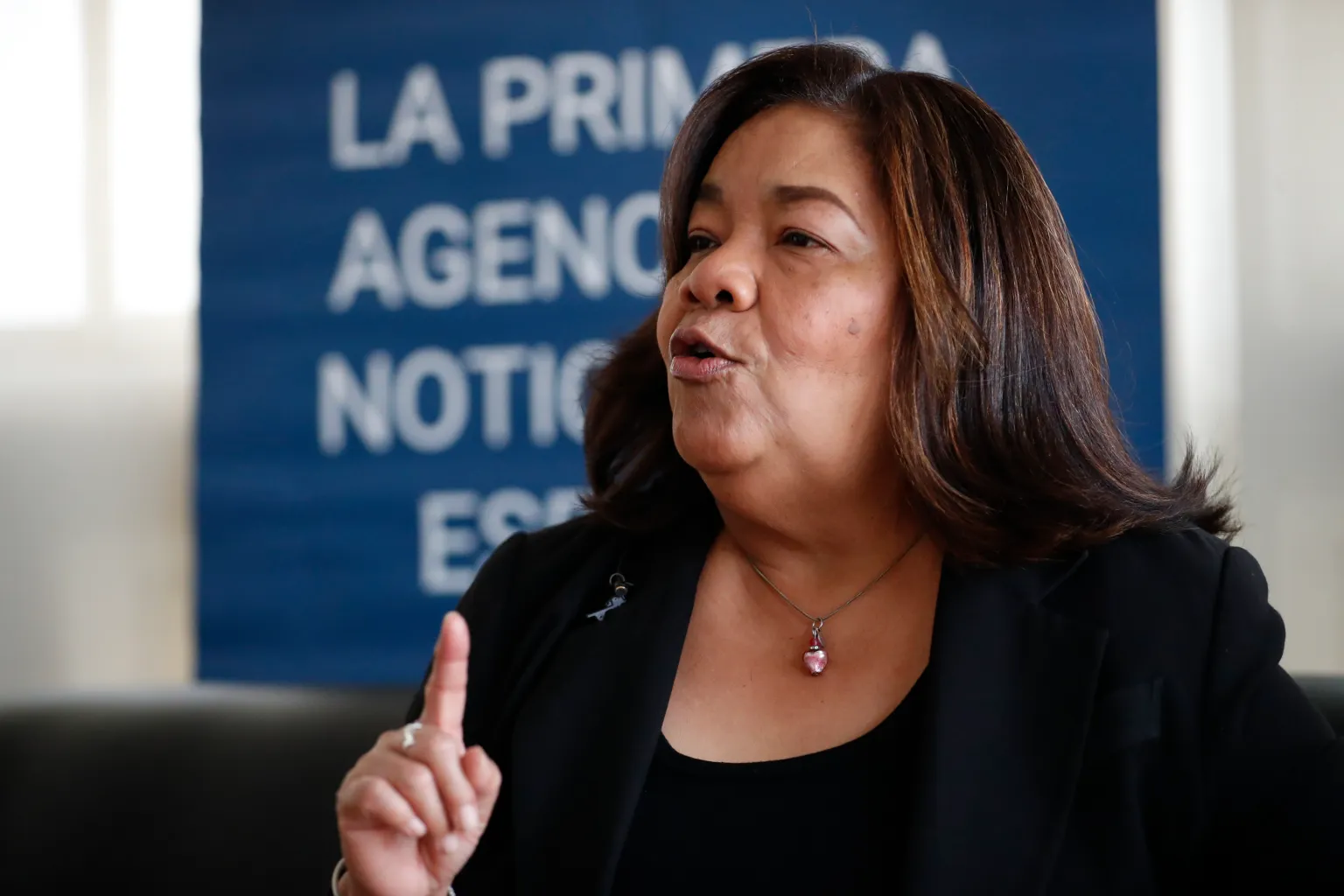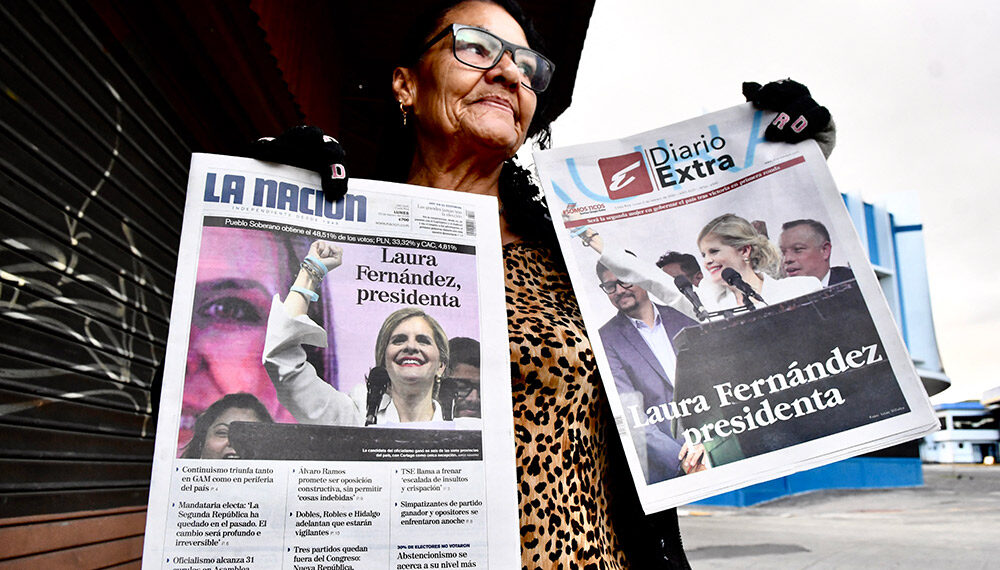Central America
Maribel Gordón, the leftist economist who aspires to the Executive of Panama with a feminist plan

The leftist Maribel Gordón, a professor and economist by profession, aspires to the Presidency of Panama in the elections of next May 5 with a government plan based on social proposals for a “dignified life”, being the only candidate with a plan focused on equality policies.
“That is our approach, which incorporates women in decision-making and my main proposal is a national budget with a gender perspective,” he said in an interview with EFE Gordón, an independent candidate and who is among the last places in all the polls, which he does not recognize and in which he borders on 2% of voting intention.
In the opinion of the candidate, the State approves “dead (and) empty laws” with a gender focus, because they do not have sufficient resources to put them into practice, they only serve to wash the international image, “without any responsibility or will to be executed.”
Gordón, 62 years old and popularly known as ‘La Profe’, is the only candidate with openly socialist ideas and supported by the feminist movement of the Central American country by having a public discourse against sexist violence and equality gaps.
She considered herself part of the feminist revolution from a very early age, when it was still officially chosen who represented the movement. “I joined a group of 14 women who carry out these flags because the gender inequality gaps in Panama are deep.”
He explained that in the country there are “low wages” for women because they are “placed in economic activities where the minimum wage predominates” because “the system does not generate decent employment for women.”
“We are also proposing an institutional policy that guarantees the elimination of violence against women (because) violence begins from the institutional with a State that does not protect and that thinks that if a woman or a teenager is raped is something common or private life,” he said.
The presidential candidate has a long history within the social movements in Panama. He jumped to the public spotlight in the protests against the increase in the price of life in 2021. The prices of gasoline and other commodities skyrocketed due to global inflation.
His interventions – as if he were teaching a university class – during a frustrated dialogue table between the Government and the demonstrations to seek a solution were popularly applauded, thus forging his candidacy with the participation in last year’s anti-mining protests, before which he maintains his resounding “no” to mining in the country.
This is the third time that Gordon tries to reach the spheres of the Executive Power. The previous two times –2014 and 2019 – she was a running mate with the leftist Frente Amplio por la Democracia (FAD). The political arm of the most powerful union in the country and the one that its spectacular failure in the last elections dissolved the party.
Gordón is related to the socio-political movements of the Latin American left. A reflection of this is his Government project baptized as the ‘plan for a dignified life’, which is based on “human well-being”, “real democracy”, the “rescue of identity” and a constitutional reform through the constituent route, one of the two options that the current Magna Carta allows.
“If the left is a failure, why are there economic sanctions against those left-wing countries? (…) (For) the fear of a system that effectively works without blockades (…), at least, on issues of national and social development,” says Gordón.
Thus, he proposes to create in Panama, a country “with its specific characteristics,” a project of “national and social development, that is of the Panamanians and Panamanians for the Panamanians” to which some “examples of other latitudes” can be incorporated.
He also defends that socialism, “that phase of transition between capitalism and communism” that adapts to every historical moment, has tried to “develop” in different ways, so the governments in China, Cuba and Venezuela as well as what “tried to do in Bolivia, Ecuador, Mexico, even today in Colombia and Uruguay” are not alike.
For the elections on May 5, just over 3 million Panamanians are called to the polls.
The main candidates are José Raúl Mulino, the running mate of the disabled former President Ricardo Martinelli, for the Realizing Goals (RM) and Alianza parties. Former President Martín Torrijos (2004-2009), for the Popular Party (PP) and Ricardo Lombana for the Otro Camino Movement.
Central America
Laura Fernández Says She Will ‘Never’ Allow Authoritarianism in Costa Rica

Costa Rica’s president-elect, right-wing leader Laura Fernández, said she will “never” allow authoritarianism under her government, in her first speech after winning Sunday’s presidential election.
Fernández, the political heir of outgoing President Rodrigo Chaves, has been accused by her opponents of seeking to steer the country toward authoritarian rule through her hardline proposals against drug trafficking and plans to reform state institutions.
“I, as the new president of the Republic, will never allow authoritarianism or arbitrariness—things that no one wants in Costa Rica,” Fernández said to cheers from her supporters gathered at a hotel in the capital.
The 39-year-old political scientist criticized her rivals for centering their campaign on what she described as a narrative of “authoritarianism and dictatorship.”
“They tried to scare voters, but the electorate did not fall into the trap,” she said.
Without offering details, Fernández acknowledged that her administration will seek to change the country’s “political rules of the game,” in what she described as a necessary step for Costa Rica, one of Latin America’s most stable democracies.
Central America
Costa Rica Goes to the Polls as Voters Choose Continuity or Change

Costa Ricans head to the polls today to elect the president of the republic and 57 members of the Legislative Assembly for the 2026–2030 term. Voters must choose between continuing the political project of outgoing President Rodrigo Chaves by supporting the ruling right-wing candidate Laura Fernández, or opting for a change in direction proposed by the opposition.
Fernández, representing the Pueblo Soberano Party (PPS), leads opinion polls with close to 40% of voting intention, bolstered by the outgoing president’s approval rating, which exceeds 50%. Chaves is barred from seeking immediate re-election under Costa Rican law.
Trailing far behind is Álvaro Ramos of the National Liberation Party (PLN), with less than 10% support. He is followed by Claudia Dobles of the Citizen Agenda Coalition (CAC), Fabricio Alvarado of New Republic (NR), and Ariel Robles of the Broad Front (FA), each polling between 3% and 5%. Undecided voters, who account for more than 30% of the electorate, could determine the outcome of the presidential race or force a runoff.
In a statement, Costa Rica’s Supreme Electoral Tribunal (TSE) reaffirmed its commitment to transparent and secure elections. “As has been the case for more than 76 years of democratic life in our country, the Supreme Electoral Tribunal guarantees all Costa Ricans that the national elections to be held this Sunday, February 1, will meet the highest standards of security and absolute transparency, allowing us to continue enjoying electoral processes in peace and freedom,” the institution said.
Authorities reported that 53,251 party observers will take part in the electoral process. Of these, 12,472 belong to the Social Christian Unity Party, 11,524 to Pueblo Soberano, 10,451 to the PLN, and 4,141 to the Citizen Agenda Coalition, among others. In addition, six political parties have sworn in 7,520 members of polling station boardsdeployed nationwide.
Central America
U.S. and Guatemala Sign Trade Deal Granting Zero Tariffs to Most Exports

The United States signed a reciprocal trade agreement with Guatemala on Friday, under which 70.4% of Guatemalan exports will enter the U.S. market tariff-free.
Guatemalan President Bernardo Arévalo highlighted the importance of the agreement, stating that it creates a framework of cooperation, certainty, and new opportunities for producers, workers, and entrepreneurs in the country. His remarks were shared in a video published on his official social media channels.
In 2025, 30.3% of Guatemala’s total exports were destined for the United States, amounting to approximately $4.3 billion. As a result, the agreement is expected to directly benefit key sectors of the Guatemalan economy, including agribusiness, manufacturing, and the textile industry.
“Today we have taken another step toward consolidating a country that, when it moves forward united, generates confidence, attracts investment, and creates real development opportunities for all its people,” Arévalo added.
The agreement with Guatemala follows a similar trade deal signed by the United States with El Salvador on Thursday, which includes the elimination of a 10% tariff on Salvadoran imports.
-

 International1 day ago
International1 day agoEpstein Denies Being ‘the Devil’ in Newly Released Video Interview
-

 International2 days ago
International2 days agoSpain Seeks to Ban Social Media Access for Children Under 16
-

 International2 days ago
International2 days agoPetro Resumes Extraditions, Sends Top Criminal to U.S. Before White House Talks
-

 International2 days ago
International2 days agoMexico to Send Humanitarian Aid to Cuba Amid U.S. Threats Over Oil Shipments
-

 International1 day ago
International1 day agoHypothermia Linked to Most Deaths During New York’s Recent Cold Spell
-

 International2 days ago
International2 days agoMexico Arrests Suspect in Shooting of Sinaloa Lawmakers
-

 Central America3 days ago
Central America3 days agoCosta Rica Goes to the Polls as Voters Choose Continuity or Change
-

 International13 hours ago
International13 hours agoDelcy Rodríguez Takes Control of Chavismo as Venezuela Enters a U.S.-Supervised Transition
-

 International13 hours ago
International13 hours agoHRW Warns Trump’s Influence Has Weakened Human Rights in Latin America
-

 Central America2 days ago
Central America2 days agoLaura Fernández Says She Will ‘Never’ Allow Authoritarianism in Costa Rica
-

 International2 days ago
International2 days agoNFL Investigating Emails Linking Giants Executive to Jeffrey Epstein


























